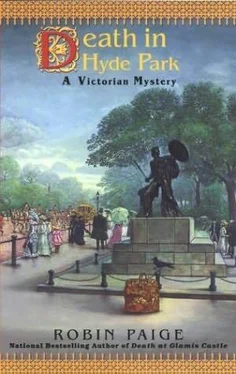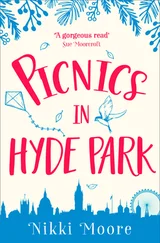Robin Paige - Death in Hyde Park
Здесь есть возможность читать онлайн «Robin Paige - Death in Hyde Park» весь текст электронной книги совершенно бесплатно (целиком полную версию без сокращений). В некоторых случаях можно слушать аудио, скачать через торрент в формате fb2 и присутствует краткое содержание. Жанр: Классический детектив, на английском языке. Описание произведения, (предисловие) а так же отзывы посетителей доступны на портале библиотеки ЛибКат.
- Название:Death in Hyde Park
- Автор:
- Жанр:
- Год:неизвестен
- ISBN:нет данных
- Рейтинг книги:5 / 5. Голосов: 1
-
Избранное:Добавить в избранное
- Отзывы:
-
Ваша оценка:
- 100
- 1
- 2
- 3
- 4
- 5
Death in Hyde Park: краткое содержание, описание и аннотация
Предлагаем к чтению аннотацию, описание, краткое содержание или предисловие (зависит от того, что написал сам автор книги «Death in Hyde Park»). Если вы не нашли необходимую информацию о книге — напишите в комментариях, мы постараемся отыскать её.
Death in Hyde Park — читать онлайн бесплатно полную книгу (весь текст) целиком
Ниже представлен текст книги, разбитый по страницам. Система сохранения места последней прочитанной страницы, позволяет с удобством читать онлайн бесплатно книгу «Death in Hyde Park», без необходимости каждый раз заново искать на чём Вы остановились. Поставьте закладку, и сможете в любой момент перейти на страницу, на которой закончили чтение.
Интервал:
Закладка:
Nellie Lovelace sat back on her velvet sofa and regarded her friend. She had met Charlotte several years before, at the very beginning of her acting career. At the time, Nellie was still taking whatever parts she could find, mostly as a bit player at Henry Irving’s Lyceum Theater. She had gone to a meeting of the Fabian Society, the foremost Socialist group in England, to hear a lecture by the drama critic for the Saturday Review, George Bernard Shaw. She and Charlotte had sat next to one another. Nellie was only marginally interested in Socialism, and Charlotte was a committed Anarchist-a rather idealistic one, in Nellie’s view-but the two women quickly became fast friends and saw one another as often as their other commitments allowed.
“Yes, that is certainly the question,” Nellie said thoughtfully. “What are you to do now?” She surveyed her friend’s disheveled appearance with a critical eye. Never very tidy, Lottie certainly looked much the worse for wear: her boots were muddied, her skirt was torn, her blouse was stained, and her hair was a matted mess. “When did you last have something to eat?”
Lottie screwed up her forehead as if she were trying to remember. “An old lady gave me half of her sticky bun-this morning, I think it was.”
Nellie frowned, thinking that half a bun since morning wasn’t enough to keep body and soul together, even if you were a stick like Lottie and used to missing meals while you pecked away all day at the typewriter. “And you’re sure you can’t go home?” she asked. “You need a change of clothing, at least.”
“I don’t dare,” Lottie replied. “If Ashcraft so much as catches a glimpse of me, he’ll have me in Police Court by morning. I need to get out of London for a while, Nellie, but I’m sure the filthy beast is watching the railway stations.” She made a wry face. “I have no money for a ticket, anyway. And nowhere to go. I’m afraid I’m a dreadful nuisance.”
“Well, money is not a problem,” Nellie said, considering. “I certainly have more than enough.” The year before, she had taken on her first important role, as Princess Soo-Soo in A Chinese Honeymoon, at the Royal Strand Theater. Musical theater had not been her goal when she had declared to herself that she wanted to be an actress-a serious Shakespearean actress. But Nellie was nothing if not practical, and she had quickly discovered that there was a great deal more money to be made in musical comedy, which was more respectable than music hall and more appealingly lighthearted than serious theater. She’d had some incredible luck along the way, of course-meeting Lady Sheridan, for instance, who had introduced her to Henry Irving and Bram Stoker at the Lyceum, and then to Frank Curzon, who managed the Royal Strand. It was Lady Sheridan who had persuaded Mr. Curzon to give her a part as one of the bridesmaids in A Chinese Honeymoon, and he had suggested that she understudy the leading lady. When Beatrice Edward got into a tiff and left the play, Nellie had stepped into her role.
And from there on, it had been roses all the way. It looked as if the musical might enjoy a very long run, and Nellie was so much admired as Princess Soo-Soo that her dressing room was banked with fresh flowers every night and she was bombarded with invitations from men who wanted to make her acquaintance. Her photograph was in all the shops, her name was in all the newspapers, and she had a dozen admirers on her string, such as the charming American adventure writer she had met at the home of the Palmers the day before. Jack London was quite the man, she thought, and his rough-hewn American ways made him seem more rugged and virile than the foppish young men who usually courted her.
But that was all by the way. More important than attention, success brought money. Nellie was earning forty pounds a week-an unimaginable amount for a young woman who four years before had lived on one of the worst streets in Whitechapel and could only dream of somehow, someday becoming a lady, with beautiful dresses in her closet and clean sheets on her bed. Her earnings had enabled her to find this absolutely topping West End house with a bathroom with piped-in hot water and a garden and furnish it exactly as she’d always wanted, with a golden velvet sofa in her bedroom and yellow silk bed curtains, and a Persian carpet thick enough to curl her toes in. But her money and her newfound fame hadn’t separated her from her old friends-like the Palmer girls, who still lived with their policeman father in the East End, and Lottie Conway-and Nellie vowed that it never would. Whenever necessary, she was there to help.
Lottie lifted her chin with a proud look. “I’m not going to take any of your hard-earned money, Nellie. I can manage for myself.”
“Rubbish,” Nellie said, with a careless wave of her hand. “Don’t push your ridiculous Anarchist principles onto me, Lottie Conway. I know you’re a staunch comrade and all that, but everybody needs a helping hand every now and then, and you’re in a bit of a fix, if you ask me.” She frowned at her friend. “Let’s see, now. When exactly was it that you did your mad daylight flit across the roof?”
“Yesterday morning,” Lottie replied unhappily, looking down at the cuts and scrapes on her capable hands.
“It might be yesterday week, from the look of you,” Nellie said in a crisp tone. When Lottie looked up, her eyebrows raised, she added imperiously, “Well, take a peek at yourself, then.” She took Lottie’s hand and pulled her up, turning her around to face the cheval mirror in the corner of the bedroom.
“Oh, dear,” Lottie said, with an embarrassed little laugh. “My face is rather dirty, isn’t it? And my hair-” She turned away from the mirror. “I shouldn’t have come here,” she said quietly. “You can’t have me hanging about, Nellie-I’m too simply awful. I’ll go straightaway. You don’t need to see me to the door.”
“You are simply awful.” Nellie rolled her eyes in a theatrical gesture. “Your face is unspeakably dirty, your hair needs a wash and a curl, your boots are positively done for, and every stitch of your clothing ought to be burned. You are definitely going straightaway-for a bath.” She steered her friend toward one of the doors off her bedroom. “I think I can find something that might fit you.”
“But what-” Lottie spluttered, resisting. “What are you-”
“Don’t ‘but what’ me, Comrade Conway.” Nellie pushed her into the bathroom and closed the door firmly. She raised her voice. “If you turn the tap on the tub, you’ll get three gallons of hot water a minute. If you want more, it’ll be hot again in ten minutes. There are towels in the cupboard, and soap in the dish. I’ll get you something clean to wear. And after that, we’re having ourselves a nice tea.”
“But, Nellie-” Lottie protested.
“I don’t want to hear another word,” Nellie said smartly, “unless it’s pass the jam. ” And with that, she went to her closet and pulled out a pretty cotton frock with embroidered lace on the bodice, singing under her breath the first verse of “I Wants to Be a Lidy.”
CHAPTER SEVEN
Despite the long-standing prejudice against women farmers in England, a number of women owned and managed their own farms, and quite capably, too. In Berkshire, in the 1880s, Mary Bobart ran a farm of 250 acres, employing eight men and five boys. After Mary Ann Pullen was widowed, she expanded her husband’s farm from 340 to 450 acres. In Lincolnshire, in the 1890s, Mrs. Watson of Market Deeping owned and managed a hundred-acre farm and a retail shop where she sold farm produce. “I could certainly not have brought up my four children without the aid of the business,” she said. By 1911, the British census reported 4,043 unmarried women farmers in England and Wales.
Интервал:
Закладка:
Похожие книги на «Death in Hyde Park»
Представляем Вашему вниманию похожие книги на «Death in Hyde Park» списком для выбора. Мы отобрали схожую по названию и смыслу литературу в надежде предоставить читателям больше вариантов отыскать новые, интересные, ещё непрочитанные произведения.
Обсуждение, отзывы о книге «Death in Hyde Park» и просто собственные мнения читателей. Оставьте ваши комментарии, напишите, что Вы думаете о произведении, его смысле или главных героях. Укажите что конкретно понравилось, а что нет, и почему Вы так считаете.












